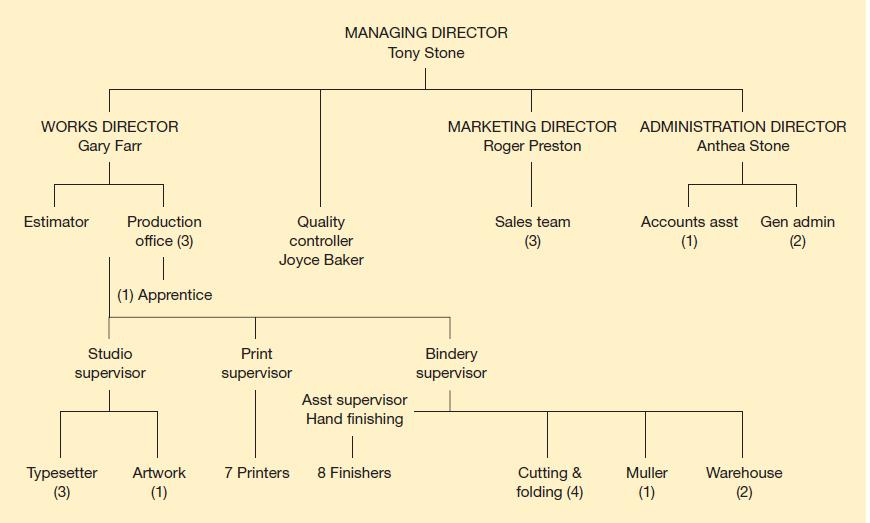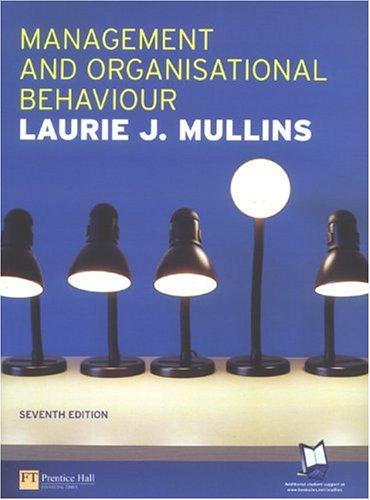Rudmore Press was founded in the early 1970s by the current managing director, Tony Stone, and his
Question:
Rudmore Press was founded in the early 1970s by the current managing director, Tony Stone, and his friend and partner, Roger Preston. The original company was housed in a large shed in Tony's garden and start-up capital to buy the first hand-operated printing press was provided by his parents. From this inauspicious beginning, the company expanded into its own premises in the early 1980s and then again in the mid-1990s to a purpose-built factory and warehouse. The company provides a wide range of printing work to local businesses and operates in a highly competitive market. In the beginning, lack of working capital caused much work to be contracted out, but a policy of continuing investment meant that the company has now been able to equip its premises with the latest colour printing presses and computerised typesetting facilities. This has enabled most work now to be completed in-house, a service which has been enhanced by joining forces with two small independent lithographic companies who run the in-house plate making services from Rudmore's premises. Modern production facilities are underpinned by a comprehensive warehouse system housing guillotines and folding and cutting machines, together with a computerised dispatch system which produces and co-ordinates all customer documentation.
The original two-man team was joined in the late 1980s by Gerry Farr to oversee production; shopfloor and supervisory staff were taken on as business levels demanded. Rapid growth during the middle and late 1900s meant that the company seriously had to review its organisation structure. Gerry Farr was promoted to works director; Roger Preston moved from works manager to marketing director to reflect the need which the company had identified to seek out new markets; and Tony's wife, Anthea, was brought in to the company on a part-time basis to oversee administration and personnel.
Additionally, a quality controller, Joyce Baker, was appointed to lead the initiative to obtain the International Standards Organisation Approved Quality Standard Certificate. (See Figure 23.12.) Tony is a dynamic managing director who realises that the organisation is still very much in an embryonic state of development. A highly intelligent and charismatic figure, well known in the local community, he believes in allowing people to manage their own functions and becomes frustrated when they appear to be failing to do so.
Passionately believing in his company, he always seems to know what is going on. He works long hours, often appearing to tackle several important tasks at once, and sets himself, and others, tight deadlines and seemingly impossible objectives. He has received little formal management training and recognises this possible shortfall in his development, but never seems to find the time to undertake a course of study. He feels that he has a moral and financial obligation to Roger, his original partner who is now a major shareholder.
Conversely, Roger is an introverted individual who is devoted to his wife and family. He believes that the company has grown too quickly for his own personal comfort. He feels most at home when getting his hands dirty on one of the presses and doesn't really want to be the marketing director.
Indeed, he isn't really sure what the job involves except that Tony had told him that he is to search out new markets and improve sales. Tony had also recently asked him to recruit and manage a small sales team, a task that Roger had inwardly dreaded.
Gerry Farr is very much a 'hands on' manager who began his career as a printer. He feels happiest when he is on 'his' shopfloor rather than in the boardroom. Tony has identified a management course for Gerry to attend but Gerry is resisting it on the grounds of pressure of work. On this note, Gerry feels than he works very hard, often putting in more hours than the other three, and sometimes feels resentful that, unlike the others, he has no shareholding in the company.
Questions
As a member of the consultancy team you are required to prepare a report indicating clearly:
a. The factors to be considered in your analysis of the organisation;
b. Which of these factors should be given the highest priority, together with your supporting reasons;
c. How your ideas and recommendations might best be implemented; and
d. The relevant theoretical or other models you would bear in mind.
Step by Step Answer:






